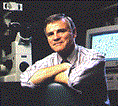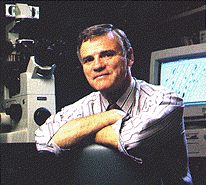New Institute for Systems Biology to Open in Seattle

 Dr. Leroy Hood announced last week the formation of a new independent, non-profit organization, the Institute for Systems Biology, to be based in Seattle, Washington. The concept behind the Institute is to establish a medium for collaboration between diverse academic and private-sector interests -- particularly high-tech industries. Hood said its structure will combine private-sector strengths -- including greater flexibility and financing options -- with academia's freedom from the constraints of short-term profit requirements.
Dr. Leroy Hood announced last week the formation of a new independent, non-profit organization, the Institute for Systems Biology, to be based in Seattle, Washington. The concept behind the Institute is to establish a medium for collaboration between diverse academic and private-sector interests -- particularly high-tech industries. Hood said its structure will combine private-sector strengths -- including greater flexibility and financing options -- with academia's freedom from the constraints of short-term profit requirements.Systems biology promises to achieve strides for healthcare in the 21st Century. Hood, who is credited with developing the technology that enables scientists to read, record and analyze such large volumes of information, is an advocate for collaboration between natural scientists and the specialists who can design tools biologists need to understand complex biological systems.
``America's high tech revolution is enabling a biotech revolution, and the technological wealth of the Puget Sound region will provide fertile ground for the Institute to grow,'' Hood said. ``The time is right, and Seattle is an ideal location to develop the technologies that will shape the future of biology and medicine.''
Hood also said biologists increasingly recognize that large-scale, multidisciplinary approaches are necessary to understand complex biological systems, leading to a day when computers outnumber microscopes in many laboratories.
``Traditionally, biology has focused on studying individual genes, proteins and cells in isolation, but we're learning that biologically significant phenomena arise from complex interactions of numerous gene, protein and cell elements that form informational networks and systems,'' Hood said. ``These networks and systems reflect the biological instructions encoded in every cell. Computers have opened the possibility of recording and analyzing the elements that form the codes.''
Hood, the William Gates III Professor of Biomedical Sciences at the University of Washington, founded the University's Department of Molecular Biotechnology and served as its chairman. He is leaving the University to devote full-time energies to the Institute.
Hood reviewed options for building the Institute within the University of Washington, but a number of considerations weighed in favor of a private, non-profit structure. The Institute will enable scientists to custom-mold an organization that provides flexibility to form innovative partnerships and will be driven solely by the goal of advancing systems biology.
The Institute's Board of Trustees includes Dr. George Rathman, former CEO of Amgen and ICOS; and Dr. Roger Perlmutter, Executive Vice President of Merck Research Laboratories. The first to join the Institute's Scientific Advisory Board are Dr. Lee Hartwell, Director of the Fred Hutchinson Cancer Research Center; and Dr. Sydney Brenner, a pioneer in molecular biology and genetics. Louis Coffman will serve as the Institute's Acting Chief Operating Officer.
The Institute opens next month. An anonymous donor recently provided $5 million to fund the Institute's initial efforts. Collaborative agreements are in place or being negotiated with eight different companies. Future sources of funding will include endowments; federal grants and contracts; foundation grants; industrial partnerships; private donations; and equity from companies that spin off from the Institute's work.
Hood envisions establishing a world-class campus for the Institute that offers room for several hundred researchers and options for expansion, including space for academic and industrial partners to build adjacent structures.
CONTACT: Kevin Evanto or Geoff Patrick of Cocker Fennessy, 206-652-9506, for Institute for Systems Biology
